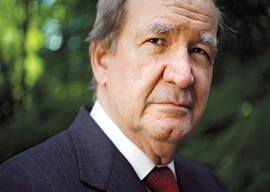
February 09, 2012

Patrick J. Buchanan
Pat had come to the convention with a respectable showing in the primaries. Nearly three million people had voted for him—23 percent of all votes cast. The GOP establishment badly wanted those votes for George H. W. Bush in the general election and were willing to pay for them.
While she was at the convention, [Pat’s sister and campaign organizer] Bay got a call from Bush’s advisors to ask if they could meet to discuss Pat.…The polls showed that Bush needed Buchanan’s endorsement. What was Pat’s price? “We want a primetime speech,” she said.
She kept saying it until the Bush people caved. The result was Pat’s “Culture War” speech, a splendid flight of oratory that electrified conservatives. Reports Stanley:
Before the convention, Clinton led Bush 52-35 percent. After the convention, Clinton led by just 45-42 percent. The President led among men by 47-41 percent. The leap came the day after Buchanan’s speech.…
Bush himself seemed to be pleased with the speech, congratulating Pat personally at a party that evening. Other elements in the party were horrified. The neocons did not yet have their thumbs pressed as firmly on the GOP’s windpipe as they would four years later, but there was a sufficient spirit of cultural appeasement in the Republican establishment to provoke a swift backlash: a hatred of ideas, a terror of strong opinions, and an awareness of the fortunes to be made by moving factory work to cheap-labor countries.
Media allies were hastily enlisted, and a parade of GOP moderates offered up prime-time condemnation of Pat’s speech. On the psephological evidence, it might have saved the administration; in the lightning-fast rewrite of history accomplished by the GOP panjandrums and their media shills, it had hurt the administration.
In just twenty-four hours, Pat went from the voice of the people to right-wing nut.
(There is an interesting parallel here with the historical rewrite of Republican Pete Wilson’s governorship in California from 1991-98. There is now an entrenched myth that Wilson’s support for initiatives against illegal immigration and multiculturalism killed his party in that state. In fact all the initiatives were popular, and “He left office in 1998 (due to term limits), with his approval rating at its highest level ever—55 percent to 37 percent among registered voters in the Sept. 1998 L.A. Times Poll.” Who controls the past, controls the future.)
I can find no serious fault with Timothy Stanley’s account of Pat’s career. The only discordances arise from the fact that even to such a sympathetic observer as Stanley, born I would guess around 1980, Pat is a traveler from another time.
Hence such oddities as:
Tragically, the conservative response to AIDS led to the stigmatization of homosexuals.
Since homosexuals were indisputably the disease’s main agents of transmission, why should they not have been stigmatized?
Regarding the profanities and epithets from Nixon’s White House tapes:
Only those who shared Nixon’s prejudices could have missed how horrible they really were.
Only those steeped in Generation X’s sissified sensibilities could have missed how commonplace Nixon’s words and opinions were in his time.
Those are not writerly delinquencies, though, only intergenerational incomprehension. The Crusader is a fine book that delivers what it promises. It is a worthy tribute to a man who, if he had attained the presidency, might have been able to slow our nation’s descent into tribalism and bankruptcy.
From the long perspective—that of historians in the year 2100 AD, perhaps—Pat will likely appear a tragic figure who fought a doomed rearguard action against malign forces. Strange, then, to find oneself finishing this book heartened, even exhilarated. Yes, all political careers end in failure; but there can be nobility in failure, and honor, and even satisfaction. Have no regrets, Pat.